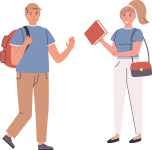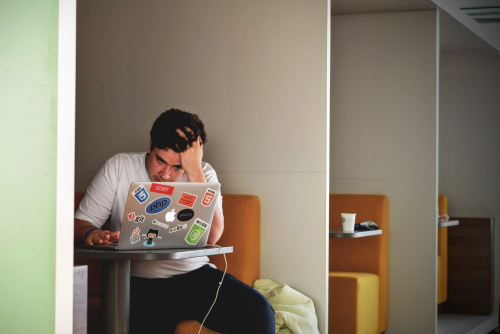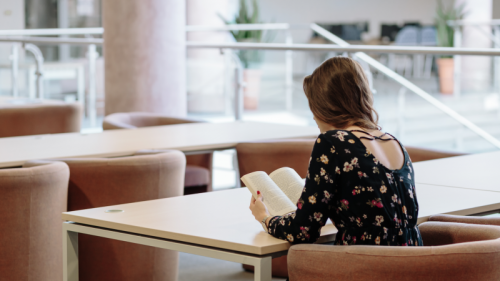
That’s why we’ll dedicate this article to ways for boosting motivation and tips for studying from home. To give you some real tools that you can work with, it’ll be slightly longer than usual – we hope you don’t mind.
How to overcome a lack of motivation
Let’s start with being realistic. This first week of January is probably different from the last 2 weeks – full of celebrations – and different from the weeks before that when you were working toward that very welcome Christmas break. Start by acknowledging that fact, and that it might take a moment to get back into it – that’s okay!
-
Slowly but gradually
Then, when you begin, start with setting small but incremental goals for yourself. If your only goal is finishing that essay or studying all the exam material, this will loom over you like a mountain surrounded by thunderous clouds. However, when you take it to step by step, every sub-goal that you achieve confirms to yourself that you’re actually getting things done. This motivates to keep going in a way similar to all those achievements that you get in gamified apps.
-
Stay connected
Now after all the social celebrations you might be tempted to shut yourself off to crank out that paper or crush that exam material. However effective this monk mode can be, there’s always a point of diminishing returns. We’re social creatures, and this means that socializing is essential for us to feel and perform well.
So, make sure you see people, not just online. This can be as simple as meeting up for a meal or study session – you have to study and eat at some point anyway. Another way to kill 2 birds with 1 stone is by going for a walk or bike ride together. Yes, we know it’s cold and often rainy during this season, but fresh air and natural light are vital to us, and you’ll appreciate being inside so much more when you come back.
-
Stimulate your brain
If you persist on staying inside, those walls around you have a tendency of closing in on you. Moreover, it’s not just the outside air and light that make us feel and function better, it’s also the change of environment. Different environments stimulate your brain, which fosters creativity and hence motivation.
Want to ensure that you continue to reap those benefits? Simply switch up your walking and cycle routes on a regular basis!
Tips for studying from home
Begin by analyzing what type of routine works for you. Are you an early riser? Then mornings are probably your most productive times of the day. Your creativity, however, may spark when everything quiets down in the evening.
Plan your tasks accordingly; in this example, you’d do your precision work and make your miles in the morning, socialize in the afternoon, and free-flow with ideas in the evening. For late risers it may be the other way around – mix and match according to your personal routine.
-
Task-based scheduling
As a student, you’re not being paid by the hour, so it doesn’t really make sense to plan that way either. Thus, when you prepare an exam or write a paper, divide the sub-tasks over your day segments instead of the hours that you will use to prepare it. Naturally, it helps to schedule this according to your routine as well.
-
Dedicate your environment
When you study from home, it’s important to dedicate a space for this activity. This is important because of our brains associate spaces with activities. This means that if you study at the same place that you eat or relax, your brain automatically starts thinking about those things while studying too. Equally, if you both sleep and study in your bed, it’s harder to fall asleep, because your brain is used to thinking about your study material in bed too.
So, dedicate a space to studying, to relaxation, to eating, to sleeping, and to any other activities. You can even split your study space into creative, productive, and collaborative segments. Are you living in 1 room/studio? Then dedicate (sub-)parts of your accommodation, or shift your furniture or desk setup when you switch activities.
-
Energize yourself
Start by opening at least 1 window. Ventilation is not just important to prevent corona from settling, it’s essential to keep your brain active as well. Oxygen is fuel, so make sure that you get a fresh supply of this throughout the day. Now the draft from the window might be cold, but you can easily fix this with layers of clothing.
Another way to get warmer is to simply move around. Getting up from your seat 2-3 times per hour is definitely a good move. This doesn’t have to break your study session; you can simply stretch or walk around your room while talking to yourself or your partner.
But what if I get an epiphany? Just run back to your desk to write it down, knowing that you’ll get warm even faster this way!
Finally, get your heart racing at least once a day. This doesn’t mean that you have to do a complete workout every time. A little sprint (to the supermarket) or a few burpees does the trick as well. When you regularly raise your heart rate, you’ll draw in more oxygen while your resting heart rate lowers. Both are associated with tons of health benefits and translate in more energy throughout your day.


























